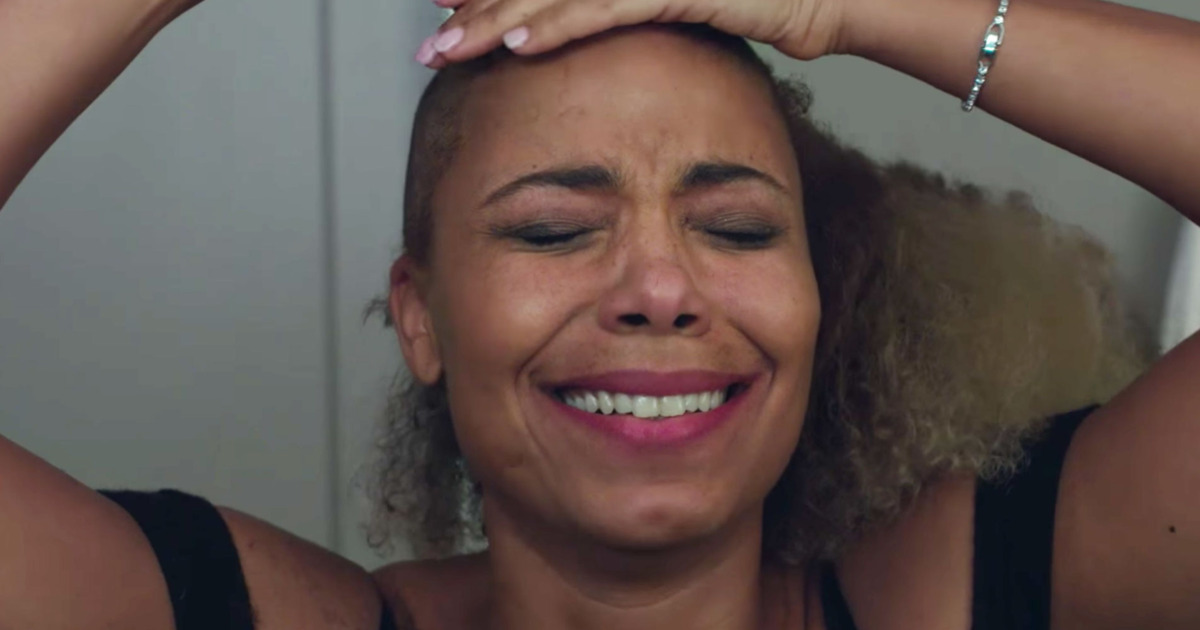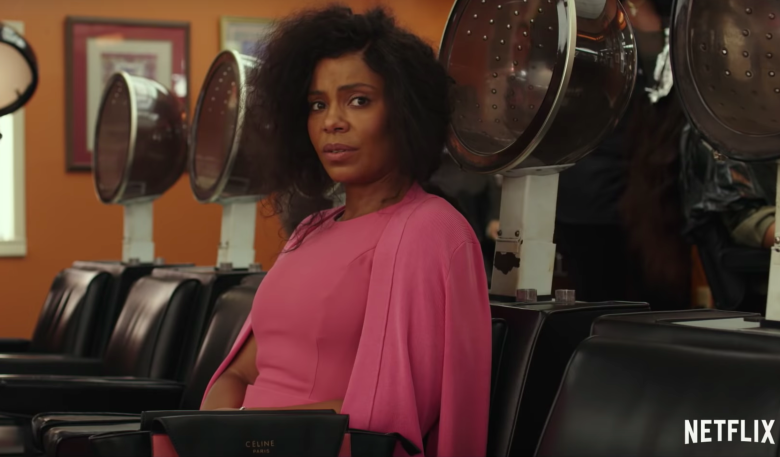
via Netflix
This article contains spoilers.
Black women’s hair is, and has been policed by everyone, from our family members, to our men, to white people, to the extent that hair has been used as a political statement to fight against what is deemed professional or beautiful. Just last month, we saw a 12-year-old boy banned from a school in Fulham for not cutting his dreadlocks off.
With the release of Netflix’s latest original movie, Nappily Ever After, an adaption of Trisha R. Thompson’s novel of the same name, conversations have erupted around the film on black twitter dividing opinions along the way.
A romantic comedy, though outdated, far-fetched and little predictable at times, Nappily Ever After is still light-hearted and comedic in depicting the story of a woman’s path to navigating societal beauty standards placed on her. Although it would have been great had it been released earlier, as the natural hair movement has been around for over a decade now, it is still relevant to the struggles of black women today around the world in regards to our hair.
It’s common to be hit with the familiar line from older parents and relatives “so when are you going to do your hair?”
The movie was Directed by Haifaa Al Mansour, Saudi Arabia’s first female director, famous for her radical movie Wajdja, which brought the 44-year-old director international acclaim. In Nappily Ever After, the protagonist, Violet (Sanaa Lathan), has the perfect job, perfect house, and seemingly perfect life. She does, however, have issues with control, and gains her self-worth by the straightness of her hair, whilst also being obsessed with upholding everyone else’s idea of perfection for her life.
The story opens with an 11-year-old Violet jumping into a pool after being challenged by a boy much to her mum’s disapproval, to then be ridiculed by the same boy and others when her hair reverts to its natural state. Throughout the movie we witness her overbearing mother (Lynn Whitfield) whose preoccupation with appearance and what it is to be ladylike and feminine is inherited by Violet. This feeds into the notion that black mothers are the principal shapers of our identity as black women, therefore passing on their positive and negative views of self onto us.

Netflix
Paulette’s views highlight the generational issue of this ingrained mentality that natural hair is unacceptable, unprofessional and undesirable during a time in which relaxers and wearing wigs was the norm. Many naturals will know, when wearing their hair in its natural state for the first time, it’s common to be hit with the familiar line from older parents and relatives “so when are you going to do your hair?”
Like this, there are many other relatable moments in the movie – young black girls being at the mercy of the hot comb, curly perm or relaxer are seen through young Violet’s detailing of her hair routine. Other examples include the fear of sweating during intimacy or physical activities shown through Violet not allowing Clint (Ricky Whittle) to touch her hair during a sexual encounter.
Will comes out with some questionable lines such as: “didn’t the hum of the clippers (after Violet’s big chop) sound like Harriet Tubman calling you to freedom?” Please kindly leave Harriet Tubman out of this.
The climax however comes when Violet’s life slowly begins to go downhill after her breakup from her boyfriend, and in a drunken moment shaves off her hair. It is only then that she is forced to face the person hiding underneath the hair that she used a crutch for her insecurities. Lathan acts out perfectly the whirlwind of emotions that come with cutting away something seen as so intrinsic to many women’s identities.
The storyline, however, feels underdeveloped in some places, with some scenes seeming unrealistic; the character of Will, the ‘woke yet judgemental’ hairdresser (Lyric Benet) who Violet starts seeing after her breakup, comes out with some questionable lines such as: “what brothers want is a woman who is real” (lol okay bro); and “didn’t the hum of the clippers (after Violet’s big chop) sound like Harriet Tubman calling you to freedom?” Please kindly leave Harriet Tubman out of this.
Moreover, Violet’s strange codependency on her mother doesn’t feel believable at times. It’s unclear whether she couldn’t straighten her own hair (there’s also such as thing as relaxer just putting it out there) or if her mother arrived at her house at 5am to do it for her was intended to be a bonding moment. We need answers.
The conclusion was somewhat subversive – not your usual happy ending for a romcom. Instead of finding a man who loves her, she chooses to love herself and the person she is growing into – a liberated, self-independent, happy woman. If you were looking for something thought-provoking, you might be better off watching Jeff Stilson’s 2009 documentary, Good Hair. Nonetheless, Nappily Ever After is a light, witty and humorous portrayal of a woman reclaiming her own identity – and for that, I would recommend watching.
Nappily Ever After is now available on Netflix.









